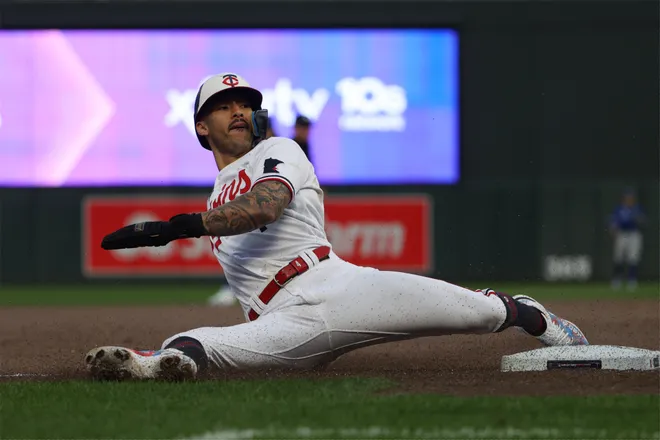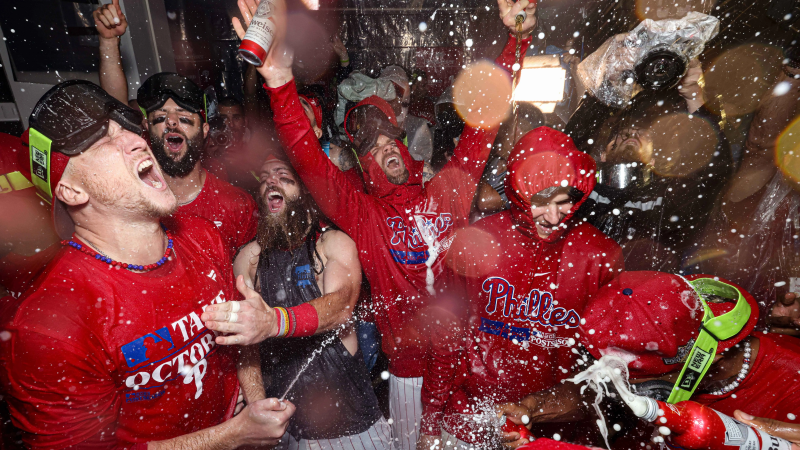'Why they brought me here': Twins' Carlos Correa ready for his Astros homecoming in ALDS
MINNEAPOLIS — It’s 6:30 p.m. as Carlos Correa watches Minnesota Twins teammate Jhoan Durán throw a third strike past Daulton Varsho and immediately pump his right fist in the air, again and again.
He listened to the sellout crowd of 38,158 scream into the night, and then he carefully jumped into the mob of humanity with the rest of the Twins, celebrating their 2-0 victory to sweep the Toronto Blue Jays in the wild-card round, snapping 21 years of postseason futility at Target Field.
Finally, the Twins won a playoff series for the first time since 2002, earning the right to go to Houston to face the defending World Series champion Astros.
The Twins hugged and congratulated one another, took pictures on the field for posterity, and opened the clubhouse doors at 6:47 for a celebration they’ve awaited a lifetime.
Twins manager Rocco Baldelli, grabbing a bottle of La Marca Prosecco, had the music turned down, looked around at his players, and shouted: “You came through."
FOLLOW THE MONEY: MLB player salaries and payrolls for every major league team
Three times.
The champagne corks popped, beers were sprayed and cigar smoke filled the room.
Correa, the veteran and highest-paid player on this team, who has a World Series ring sitting at home in Houston, took off his shirt and watched the celebration for a minute or two. He then walked out of the clubhouse, into the trainer’s room, and began treatment on the plantar fasciitis on his foot, letting his teammates celebrate for the next hour without him.
He’s been though plenty of these celebrations. He was part of the core in Houston that reached the postseason in six of his seven seasons, winning one World Series title, three American League pennants and four AL West crowns.
Now here he is, going home trying to end the Astros’ dynasty as they open a best-of-five AL Division Series beginning Saturday at Minute Maid Park.
He’s back in the playoffs, right where he belongs.
“For me, it’s knowing that if you don't win ball games, you go home," Correa said. "Going home for me was not fun. Last year when I was sitting [home] watching the playoffs, I told my wife, 'I never again want to miss the playoffs.'"
So, he did everything humanly possible to make sure it didn’t happen again.

Correa didn’t hit two home runs in the series like rookie Royce Lewis, but had two singles and drove in a run.
He didn’t pitch 7 ⅓ shutout innings like his bullpen the last 24 hours.
He didn’t make the decision that will be second-guessed throughout Canada all winter to pull starter José Berrios after 47 pitches.
No, he just happened to be the man who made two surreal defensive plays that may already be legendary in Minnesota sports lore.
“The plays he’s making the last couple of years are unbelievable," Lewis said. “He’s putting on a show."
Correa saved two runs in Game 1 when he snared a ball that went underneath the glove of third baseman Jorge Polanco that was headed to left field. He came out of nowhere, grabbed the ball and off-balance, threw out Bo Bichette at the plate, preserving their 3-1 victory.
“It was a play that I think we will see forever," Twins manager Rocco Baldelli said. “In Twins history, that play’s not going to go away. Some players we start to see less of as time goes on, but that one, I think is going to stick.’’
And, then, there was the glorious maneuver that saved Wednesday’s game.
The Twins were clinging to a 2-0 lead in the fifth inning when Twins starter Sonny Gray ran into his first sign of trouble. The Blue Jays had runners on second and third with two outs and Bichette, their cleanup hitter, at the plate. The count reached 3-and-2 when Gray remembered what Correa told him in the first inning.
“I told him there were some free outs on the bases," Correa said. “He was, like 'what do you mean?’
“They're taking big leads. If you look at me, I'll give you a sign. In key spots, we can get some outs there."
Gray looked in at catcher Ryan Jeffers and decided the time was now.
Instead of throwing a pitch, he suddenly spun around.
“I turn, and when I turn," Gray said, “I see Carlos at the bag. I see Vladdy [Guerrero] off the bag."
Guerrero, with nowhere to go with George Springer already standing at third base, was completely fooled.
Correa caught the ball, slapped the tag on Guerrero and he was out.
“I felt like it was the right situation to do it," Correa said. “Three-two count, Vladdy was getting a huge lead, obviously he was trying to score on a single.
“I felt it was the right spot to do it.
"I gave him the sign. And we executed it."
It ended the threat.
Really, it ended the series.
“That kind of stuff he’s doing, it’s unworldly," said Twins pitcher Dallas Keuchel, Correa’s teammate in Houston. “He has the wherewithal. The things he does, you can’t quantify in this analytical age. That’s being a baseball player.
"I don’t expect anything less than Carlos. I’ve seen him being unbelievable from Day 1 until now."
Says Twins reliever Emilio Pagán: “He’s a big-time player. He has a brilliant baseball mind. He’s already ready for things people aren’t ready for.
“He’s made for October."
Correa may have struggled all season with his plantar fasciitis, producing the worst offensive numbers of his career, but here he is now, performing at the biggest moment of these young Twins’ lives.
“This is why we brought Carlos here" Twins president Derek Falvey said.
Now, Correa is going back to where it all started in Houston.
This is where he became an All-Star, a hometown hero, a World Series winner and one of the highest-paid players in the game. He wanted to stay in Houston, but talks never went far.
He wound up signing a three-year, $105.3 million deal with Minnesota – with two opt-out seasons. He jumped at the first opt-out, and negotiated a staggering 13-year, $350 million contract with the San Francisco Giants. They had a deal, but the Giants backed out when they balked at the medicals on a previous broken ankle. The Mets jumped in with a 12-year, $315 million deal, but Correa failed their physical too.
The Twins, who adored his leadership skills and knew just he meant to their young team, wound up bringing him back on a six-year, $200 million contract.
Well, hitting .230 with 18 homers and 65 RBI with .711 OPS was hardly what the Twins envisioned, but Correa hasn’t been healthy since May, bothered by the plantar fasciitis. Still, he refused to succumb, went on the injured list the final last two weeks of the season and vowed to be ready when it really counts.
“The reason why they brought me here," Correa said, “is first, you want to win the division. We did that. So now you throw the numbers out the window. And the [second] season starts.
“This is the season that matters."
It’s October. It’s Correa’s time of year.
“Superstars show up in the biggest moments," Gray said.
Instead of being booed as he has been in every visiting city for being involved in the Astros’ 2017 cheating scandal, Correa could receive the loudest ovation he’s ever heard on the road when he’s introduced Saturday before Game 1 of the Division Series.
“It’s going to be emotional for him," Keuchel said. “That’s where he grew up. I know in his mind, and my mind, we want to be the team that takes Houston to the brink."
Hey, considering what the Twins just accomplished against the Blue Jays, ending their 21-year curse, why stop now.
“We're going out there with the mentality," Correa said, “that we can compete against anybody.
“I feel confident going to Houston."
Follow Nightengale on X: @Bnightengale

Disclaimer: The copyright of this article belongs to the original author. Reposting this article is solely for the purpose of information dissemination and does not constitute any investment advice. If there is any infringement, please contact us immediately. We will make corrections or deletions as necessary. Thank you.







